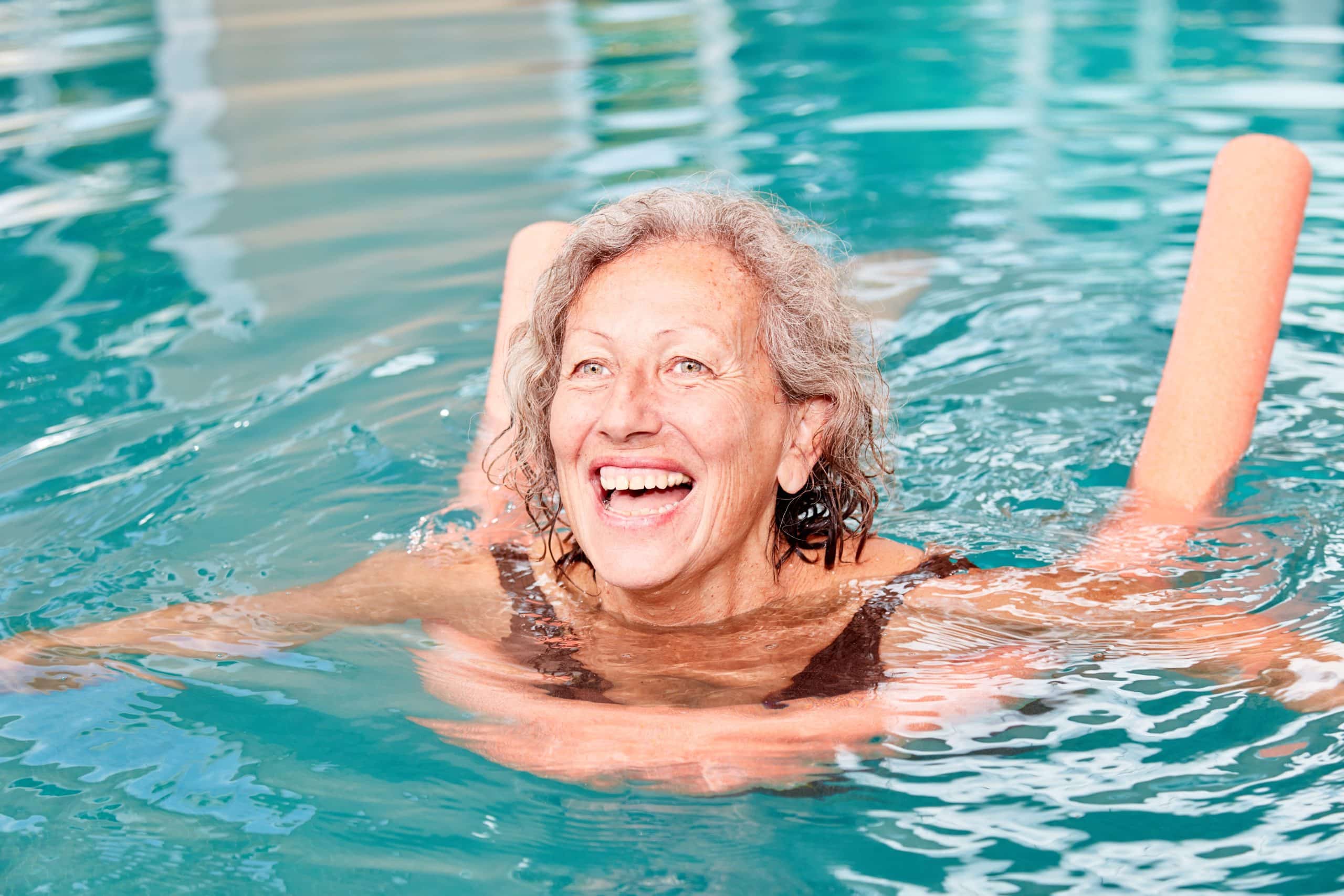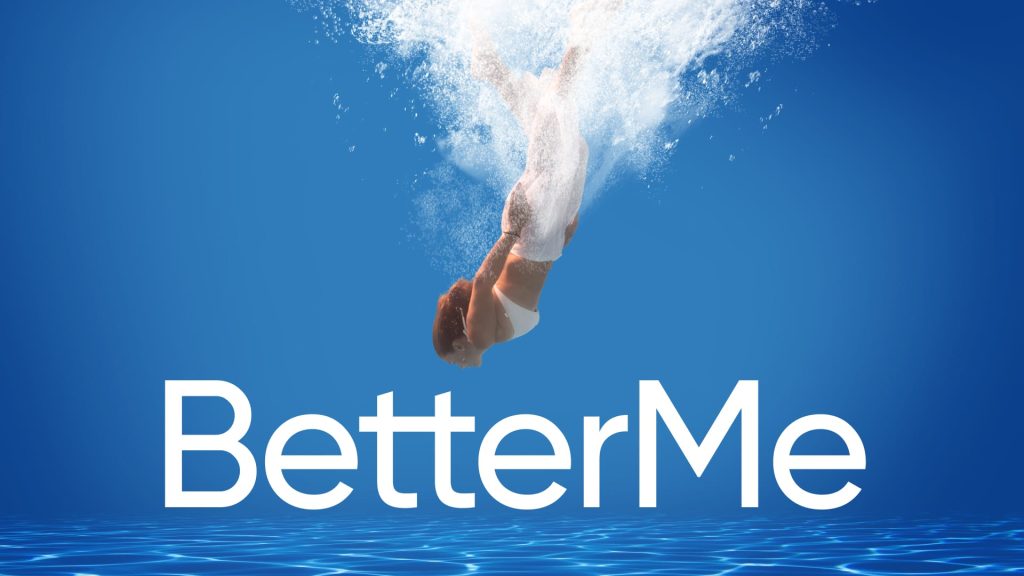Even the most sedentary person starts to look into exercise as they get older. For many, being strong enough to maintain independence and live an active life is the primary goal. Others will look beyond that and strive to remain as healthy, fit, and youthful as possible. Thankfully there are many possible exercises for seniors to choose from for health maintenance, for strength, and for mobility. Swimming is an excellent choice for seniors, as it offers a wide range of health benefits. In this article, we’ll explore the science-backed benefits of swimming as a form of exercise for seniors, and discuss how to get started safely.
1. Support For Aging Joints
A decline in joint health is a common experience among seniors (1). This is because the connective tissues around joints begin to fray and break down as they get older. Conditions like arthritis, fibromyalgia, and bursitis can all be exacerbated by certain forms of exercise.
Swimming is a great option for seniors because it provides the opportunity to exercise without putting extra strain on joints. The water’s buoyancy takes much of the weight off, reducing physical stress on joints. In fact, a 2016 study found that swimming was a safe and effective way to reduce pain in seniors with osteoarthritis (9).
2. Improved Flexibility And Range Of Motion
A common misconception about flexibility is that it’s only important for athletes. Flexibility is equally if not more important for seniors, as lack of mobility can reduce quality of life and increase the risk of falls and injuries (10).
Swimming regularly can help seniors stay more flexible and maintain an excellent range of motion in their joints. That’s because each swim stroke requires a different range of motion, which stretches and strengthens the muscles around the joints (2).
3. Weight Loss And Maintenance
Obesity among seniors is a growing concern, and carrying extra weight can increase the risk of chronic diseases like heart disease and diabetes (8). This problem is exacerbated by the fact that many seniors are unable to participate in more vigorous forms of exercise. Swimming, however, is an excellent way to burn calories and shed excess fat (12). Depending on intensity, a 30-minute session of swimming can burn anywhere between 130–310 calories for an average adult. Consistently swimming can help seniors keep their weight in check and improve metabolic health.
4. Improved Cardiovascular Health
Swimming is one of the best exercises for cardio health (6). That’s because it combines both aerobic and anaerobic activity, which allows the heart to increase its rate without putting too much stress on it. As a result, seniors can improve their cardiovascular capacity and reduce the risk of heart disease with regular swimming.
In fact, one study found that swimming twice a week for 8 weeks led to improved blood pressure and heart rate in seniors with hypertension. Further, by strengthening the muscles in and around the heart, swimming can help seniors recover from cardiac events more quickly.
5. Better Balance And Posture
Balance and posture can be especially difficult to maintain for seniors. Poor balance is often the cause for falls and other injuries in older adults. And poor posture results in back pain, neck pain, and a decrease in physical performance.
Thankfully, swimming can help with both of these issues. The resistance of the water helps improve muscle strength and posture (13). Plus, regularly transitioning between different strokes can help strengthen the muscles around the hips and core, both of which are essential for maintaining balance.
Read More: Beginner Swim Sets: Everything You Need To Know To Get Started
6. Better Sleep Quality
Some changes that come with aging, like hormonal shifts or increased pain, can interfere with sleep. But research suggests that swimming can improve both the length and quality of sleep in seniors. Indeed, exercise helps the body transition more easily into restful sleep at night (3).
In addition, the endorphins released during exercise can help reduce symptoms of stress and anxiety (4), which can contribute to better sleep. If you’re having trouble sleeping, a few laps in the pool might be just what you need.
7. Reduced Risk Of Osteoporosis
As we grow older, our bones naturally become more fragile. A combination of diet, exercise, and supplements can help keep bones strong and reduce the risk of osteoporosis (9). Swimming is an excellent way to strengthen bones, as it puts a low amount of stress on the joints while still providing resistance. Studies have found that swimming can increase bone density in both men and women, and reduce the risk of fractures. This is especially true for seniors who may not be able to partake in weight-bearing activities like running or jumping.
8. Mental Health Boost
Seniors’ mental health is just as important as their physical health. Anxiety about aging, chronic pain, and isolation can all take a toll on their emotional wellbeing. But swimming can be an excellent way to combat these issues (11). Exercise releases endorphins and serotonin, which are two neurotransmitters that help reduce stress and anxiety.
As a plus, the social interaction that comes with swimming in a group or with friends can help reduce feelings of loneliness. And the sense of accomplishment from mastering a new stroke or increasing speed can provide seniors with an extra boost of confidence.
9. Slowing Down Muscle Loss
Sarcopenia, aka muscle loss, is a natural part of the aging process. But swimming can help combat this by encouraging seniors to use their muscles regularly (5). With each stroke, the muscles must work to propel the body through the water.
This helps build muscle strength and reduce the risk of falls and other injuries. Aerobic activity like swimming helps increase the body’s endurance, which can be especially beneficial for seniors who may have difficulty with other forms of exercise.
10. Combating Menopause Symptoms
Menopause often comes with uncomfortable symptoms like hot flashes and night sweats. Brain fog, mood swings, and low libido can also interfere with day-to-day life. Studies have found that regular exercise like swimming can help reduce the severity of these symptoms and make the transition easier (7).
In part, this is due to the endorphins released during exercise that help regulate hormones. Swimming can help reduce stress and improve sleep quality, which can also help ease menopause-related issues.
BetterMe app will provide you with a host of fat-frying fitness routines that’ll scare the extra pounds away and turn your body into a masterpiece! Get your life moving in the right direction with BetterMe!
Swimming Or Weight Training, Which Is Best For Seniors?
The answer to this question is not a simple one, as both swimming and weight training offer their own benefits. Swimming is a low-impact activity that provides resistance while being gentle on the joints. This makes it an excellent exercise for seniors who may not be able to partake in other forms of exercise.
However, weight training is also beneficial for seniors, as it helps build strength and bone density. Ultimately, the best type of exercise for seniors will depend on their individual needs and abilities. Speak with your doctor or a physical therapist to determine the best course of action.
Which Type Of Swimming Is Best For Seniors?
There are four basic types of water exercises that may be beneficial for seniors:
- Water resistance exercises – these exercises use the natural resistance of water to challenge and strengthen muscles.
- Aerobic exercises – swimming or walking in chest-deep water can help boost the heart rate and increase aerobic endurance.
- Balance exercises – activities like walking in shallow water or standing on a floatation device can help seniors improve their balance, coordination, and stability.
- Flexibility exercises – stretching in the pool can help seniors improve their range of motion and flexibility.
How Can Seniors Safely And Effectively Exercise In The Pool?
Below are some safety tips to keep in mind when exercising in the pool:
The Right Swimming Pool Temperature For Seniors
The ideal pool temperature for seniors is between 86 and 92 degrees. This is warmer than a typical public pool and helps keep the body warm while exercising. Keeping the season in mind, you may need to adjust the temperature accordingly.
The Right Pool Depth
For most activities, a pool that is at least five feet deep should be used. This allows the body to be completely submerged while exercising so that seniors can benefit from the natural resistance of the water.
Read More: Swimming Vs Running: Pros, Cons, And Which One Is Right For You
The Right Gear
Swimming caps, goggles, and even flotation devices are all useful pieces of equipment for seniors. This helps them feel more comfortable in the water and to get the most out of their workout.
The Right Exercise
When it comes to exercise, seniors should focus on activities that are low-impact and that involve the entire body. Swimming, water walking, and water aerobics are all excellent options for seniors. It’s always best to work with a certified professional when exercising in the pool. They can help seniors find an appropriate workout that is tailored to their needs and abilities.
The Right Fuel
Fueling up before and after swimming is just as important for seniors as it is for any other athlete. A balanced meal high in complex carbohydrates, protein, healthy fats, and vitamins will help to replenish energy levels and keep muscles strong. Meals should be eaten at least one hour before swimming to prevent discomfort during exercise.
Hydration is also key. Seniors should be sure to drink plenty of water before, during, and after their workout to stay hydrated and prevent muscle cramps and fatigue.
Rest And Recovery
Seniors should also be sure to take rest days in between workouts. This will give the body time to recover and help prevent injury or overtraining. On rest days, seniors should focus on relaxing activities such as yoga, gentle stretching, or meditation.
Getting enough sleep is part of the recovery process and should be prioritized. Aim for 7-9 hours of restful sleep each night to get the most out of your workouts.
Betterme will keep you laser-focused on your weight loss journey! Nutrient-packed meal plans, fat-blasting workouts, galvanizing challenges and much more. Try using the app and see for yourself!
The Bottom Line
Swimming for seniors is a great way to stay fit and active. Working with a professional will help you find the best type of swimming for your individual needs, so that you can enjoy the many benefits of this low-impact exercise. Remember to focus on safety, nutrition, and rest to get the most out of your time in the pool.
DISCLAIMER:
This article is intended for general informational purposes only and does not serve to address individual circumstances. It is not a substitute for professional advice or help and should not be relied on for making any kind of decision-making. Any action taken as a direct or indirect result of the information in this article is entirely at your own risk and is your sole responsibility.
BetterMe, its content staff, and its medical advisors accept no responsibility for inaccuracies, errors, misstatements, inconsistencies, or omissions and specifically disclaim any liability, loss or risk, personal, professional or otherwise, which may be incurred as a consequence, directly or indirectly, of the use and/or application of any content.
You should always seek the advice of your physician or other qualified health provider with any questions you may have regarding a medical condition or your specific situation. Never disregard professional medical advice or delay seeking it because of BetterMe content. If you suspect or think you may have a medical emergency, call your doctor.
SOURCES:
- Aging changes in the bones – muscles – joints (2020, medlineplus.gov)
- Effects of aquatic exercise training using water-resistance equipment in elderly (2010, nih.gov)
- Effects of aquatic exercise training using water-resistance equipment in elderly (n.d., johnshopkinsmedicine.org)
- Effects of Exercise and Physical Activity on Anxiety (2013, nih.gov)
- Effects of Exercise and Aging on Skeletal Muscle (2018, nih.gov)
- High-Intensity Intermittent Swimming Improves Cardiovascular Health Status for Women with Mild Hypertension (2014, nih.gov)
- High Physical Activity Level May Reduce Menopausal Symptoms (2019, nih.gov)
- Health Risks of Overweight & Obesity (2018, nih.gov)
- Improved Function and Reduced Pain after Swimming and Cycling Training in Patients with Osteoarthritis (2016, nih.gov)
- Maintaining mobility and preventing disability are key to living independently as we age (2020, nih.gov)
- Swimming as a Positive Moderator of Cognitive Aging: A Cross-Sectional Study with a Multitask Approach (2012, nih.gov)
- The effects of aquatic exercise on body composition, physical fitness, and vascular compliance of obese elementary students (2014, nih.gov)
- The Effect of Aquatic Exercise on Postural Mobility of Healthy Older Adults with Endomorphic Somatotype (2019, nih.gov)










